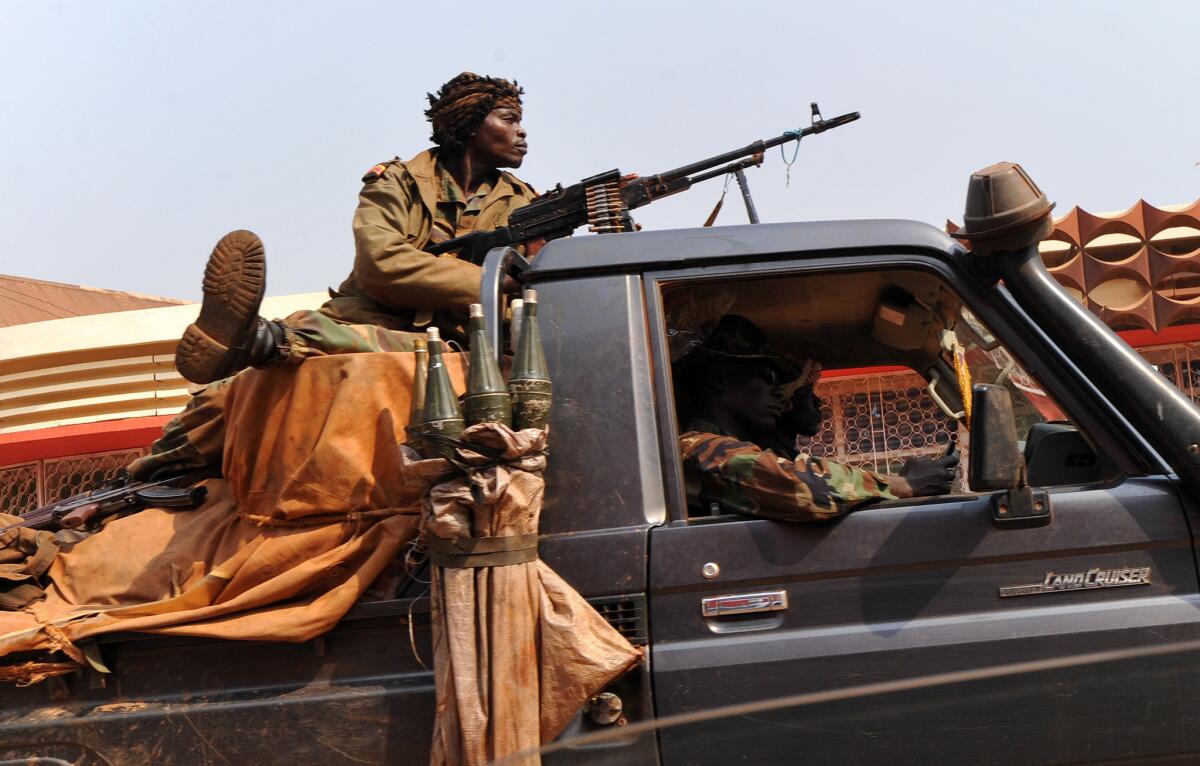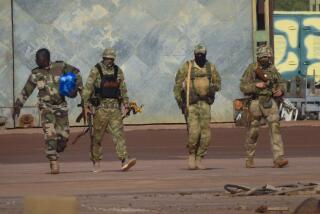African Union tells Central African Republic rebels to end uprising

JOHANNESBURG, South Africa -- The African Union on Monday warned rebels who are threatening to oust the Central African Republic government that they would face isolation in Africa, suspension from the organization and sanctions if they do so.
Nkosana Dlamini-Zuma, commission chairwoman of the AU, warned the coalition of rebels called Seleka, or the Alliance, that other African nations would not tolerate the removal of a government by force.
Dlamini-Zuma called on the rebels in a statement to end their uprising and commit to negotiations.
Central African Republic President Francois Bozize met Sunday with Yayi Boni, president of the AU, and said he was willing to include the rebels in a government of national unity. He promised not to seek another term when his current term expires in 2016.
However, rebel spokesman Eric Massi on Monday rejected the overtures in television interviews. He told France 24 television that the rebels’ aim was not to join the government. Massi also told BBC that the coalition didn’t believe Bozize’s promises.
“Know that Seleka’s aim today is not to enter into a government but to allow the people of Central African Republic to be able to drive the country toward development and self-fulfillment,” he said, according to France 24.
The AU’s solution to disputes over power or elections is often to establish national unity governments, which have had mixed success. While such arrangements might end immediate violence or fighting, they can lead to governmental paralysis, with political opponents struggling for dominance in a unity cabinet. Or they may simply paper over the cracks between opponents without resolving the conflicts, leaving disputes to fester and explode some time later.
Seleka is a coalition of three rebel groups from the north of the country that accuse Bozize of betraying agreements he made with militias in 2007 to end a war that had been raging since 2003, when he seized power in a coup.
The rebels have swept across the country in recent weeks seizing towns with little opposition from government forces. Seleka now controls a large swath of the country and appears on the brink of taking control of the capital, Bangui.
The Central African nation, situated in one of the world’s most volatile neighborhoods, has seen years of misgovernance, corruption, warfare, armed uprisings and military coups since independence from France in 1960. Though the nation is rich in resources such as diamonds, gold, timber and uranium, most of the population survives on less than $2 a day.
The rebels claim that hundreds of their supporters have been abducted by security forces, a charge Bozize -- who has twice been elected since seizing power, most recently in 2010 -- has denied.
On Saturday, the rebels took control of Sibut, around 100 miles from Bangui, putting them within striking distance of the capital. Government troops, supported by forces from Chad, have retreated to the town of Damara, less than 50 miles from Bangui.
The U.S. closed its embassy last week, evacuating about 40 people by air.
The U.S. still has troops in the country, deployed to help African forces track down Joseph Kony, leader of the Lord’s Resistance Army militia from Uganda, who is wanted by the International Criminal Court on charges of committing war crimes and atrocities. He is believed to be hiding in the Central African Republic.
ALSO:
Coalition soldier missing in Afghanistan is found dead
Israel’s former foreign minister indicted on fraud charges
Car bombing leaves at least 19 dead, 25 injured in Pakistan
More to Read
Start your day right
Sign up for Essential California for news, features and recommendations from the L.A. Times and beyond in your inbox six days a week.
You may occasionally receive promotional content from the Los Angeles Times.






